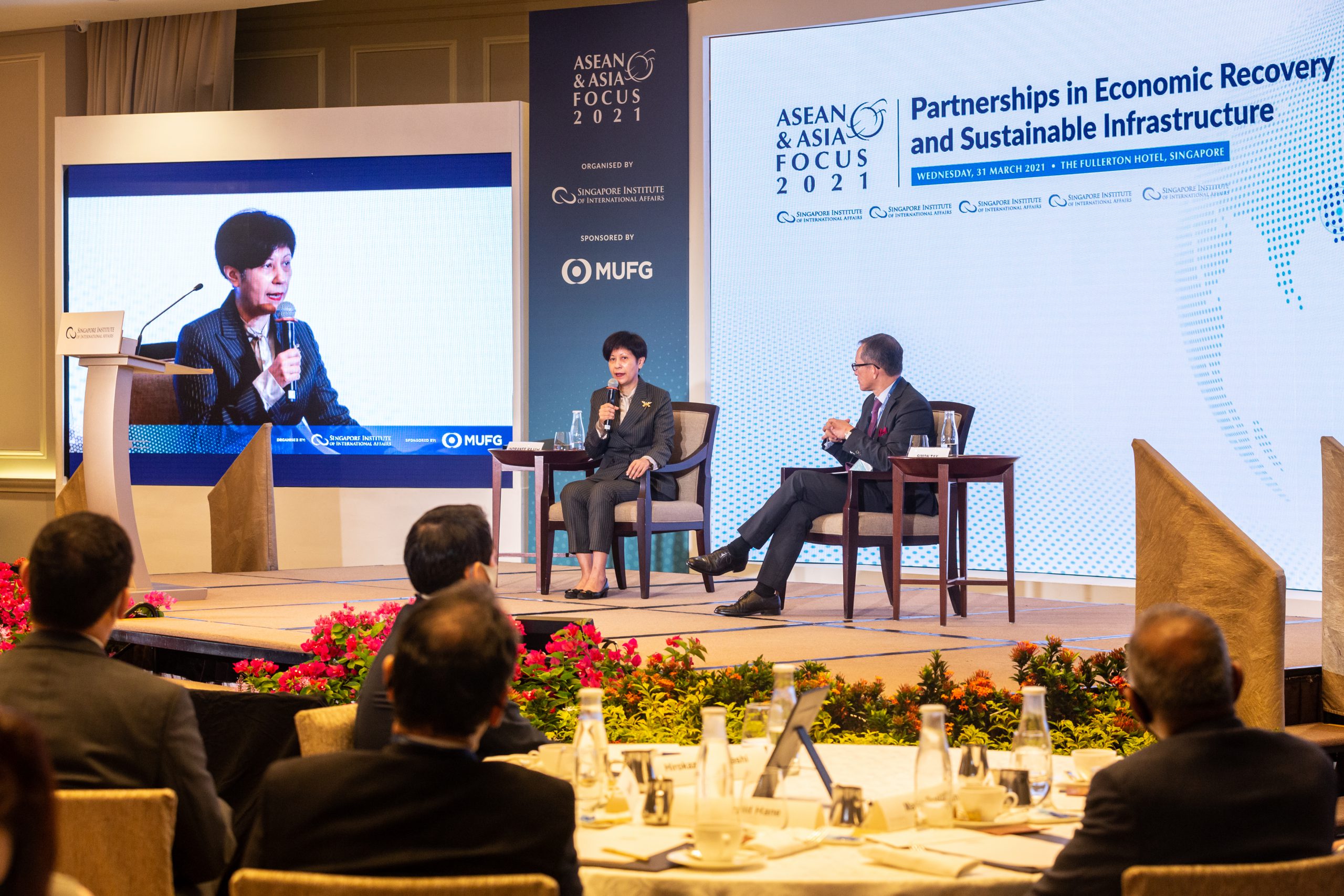The COVID-19 pandemic has heightened economic uncertainty globally, raising questions about the future of trade and investment. While borders between countries have largely remained closed for over a year, the challenges that countries face today cannot be dealt with individually as issues such as the COVID-19 pandemic and climate change do not respect any borders. This was the main takeaway from the ASEAN and Asia Focus (AAFocus) 2021 forum organised by the Singapore Institute of International Affairs (SIIA).
The AAFocus 2021 was the Institute’s first hybrid event and was held 31 March 2021. Themed, “Partnerships in Economic Recovery and Sustainable Infrastructure”, the AAFocus 2021 attracted C-suite executives, business leaders and policy makers. Some 50 participants joined the conference in-person while the remaining participants from Singapore and the region joined virtually. The forum was made possible with the support of MUFG.
Here are some highlights from the discussion. Video excerpts from the webinar will be posted on social media, with a full recording available as premium content for the SIIA Roundtable and Corporate Members.

The AAFocus 2021 was graced by Ms. Indranee Rajah, Minister in the Prime Minister’s Office, Second Minister for Finance and National Development. In her opening remarks, Ms Rajah spoke about Singapore’s partnership with its ASEAN neighbours in mitigating the impact of COVID-19 and addressing future public health emergencies. Ms. Rajah also noted that a major challenge for Asia is climate change, and the infrastructure of the future must be climate-friendly. Green finance, hence, plays a critical role as countries look towards their post-pandemic recovery.

The first panel, “Trade and Investment: Shifting Supply Chains and Prospects for Growth”, focused on ASEAN’s Covid-19 recovery and opportunities resulting from shifting supply chains. With the economic fallout resulting from COVID-19 and geopolitical challenges such as rising US-China rivalry, ASEAN countries are concerned about their economic prospects. Speakers shared their thoughts on how Singapore and its neighbours can strengthen partnerships to address common challenges. This will enable the bloc to withstand shocks and take advantage of growth opportunities to emerge more integrated, stronger and more resilient.
Panellists included Ms. Carol Chong, Director Supply Chain Resilience Division, Singapore Ministry of Trade and Industry (MTI); Ms. Pang Mei Yee, Vice President, DHL Consulting – Asia Pacific; and Professor Jota Ishikawa, Graduate School of Economics, Hitotsubashi University. The session was moderated by Mr. Manu Bhaskaran, CEO, Centennial Advisors and the SIIA’s Council Member.
The second panel, “Quality and sustainable infrastructure: Bridging expertise with ASEAN’s needs”, was moderated by Mr. Satyanarayan Ramamurthy, Partner, Head of Infrastructure, Government and Health Care, KPMG Singapore. Speakers discussed the importance of quality and sustainable infrastructure and the bankability of projects. Partners such as Japan have also played a critical role in investing in sustainable infrastructure projects in the ASEAN region. While in the short run, it may appear challenging to incorporate environmental and social considerations in infrastructure projects, case studies have shown that this will surely pay off in the long run.
Panellists included Dr. Isabel Chatterton, Director & Regional Head of Industry, Asia Pacific, Infrastructure, IFC; Mr. Lim Wee Seng, Managing Director, Head of Energy & Infrastructure, DBS Bank; and Dr. Masahiro Kawai, Representative Director and Director-General, Economic Research Institute for Northeast Asia (ERINA).

At the start of the pandemic, there was a rise of nationalistic measures with countries closing their borders and a rise of nationalistic measures such as the control of essential goods like medical equipment and vaccines. As countries come out of crisis management mode, the question of how countries emerge more resilient and sustainable becomes a pertinent one. A key conclusion drawn from the discussion at the AAFocus forum is the need to look at driving collaborations especially with countries such as Japan that have been long-standing friends of ASEAN.




